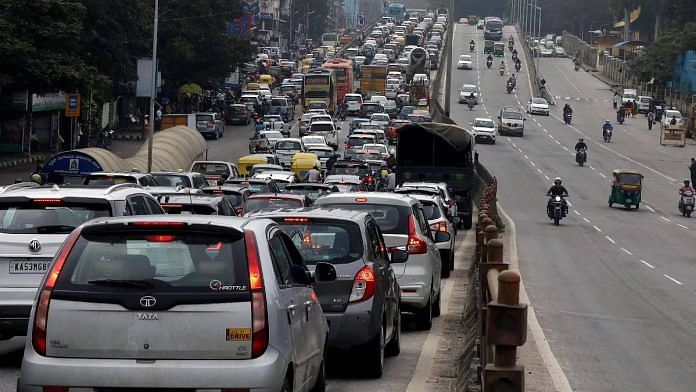New Delhi: The Economist Intelligence Unit (EIU), the research and analysis division of The Economist Group — a global media and information services company which also publishes The Economist newspaper — released its annual livability index report last week, which ranks cities across the world on their ‘livability’ quotient or condition of living offered – in a city.
Interestingly, it is Bengaluru, ranked the world’s fastest growing tech hub in a study last year, which was claimed to be the least livable among Indian cities by the index.
The EIU’s Global Livability Index 2022 analysed living conditions in 173 cities across the world, six of which — New Delhi, Mumbai, Chennai, Bengaluru and Ahmedabad — were in India. All five Indian cities were ranked between 140 and 146, which means they fell in bottom quintile on the index.
Among Indian cities, New Delhi received the top rank of 140, with a livability score of 56.5. This was followed by Mumbai at 141 (score 56.2), Chennai at 142 (score 55.8), Ahmedabad at 143 ( score 55.7) and Bengaluru at 146 (score 54.4). The ideal score is 100.
This the first time that the index has included Chennai, Bengaluru and Ahmedabad — earlier reports only featured Delhi and Mumbai among Indian cities.
Also read: India could get 8 new cities after Finance Commission provides Rs 8,000 crore grant
Bad infra pulls Bengaluru down
The cities are ranked on the basis of five broad parameters — stability, healthcare, culture and environment, education and infrastructure. Stability and culture and environment have the highest weightage — 25 per cent each — while healthcare and infrastructure get a weightage of 20 per cent each and education has a weightage of 10 per cennt.
Though Bengaluru keeps pace with the other Indian cities when it comes to stability, healthcare, culture and environment and education, it is the city’s infrastructure — or the lack thereof — where it lags behind, according to the report.
The city received a score of 46.4 (out of 100) in infrastructure, the lowest among all Indian cities. Delhi scored the highest — 62.5 — followed by Mumbai, with a score of 55.4. Both Chennai and Ahmedabad received a score of 50 each.
ThePrint tried to reach the commissioner of Bruhat Bengaluru Municipal Corporation, Tushar Giri Nath, on call and email, but received no response till the time of publication of this report.
A previous report published by ThePrint on the city’s infrastructure had, however, revealed policy related problems, faster growth of population and extension of several projects which have dug up the entire city, as some of the challenges.
Even Karachi in Pakistan, which is ranked amongst the five least liveable cities in the world in the index, scored better than Bengaluru on the infrastructure parameter — 51.8. Bengaluru’s infrastructure score is comparable to that of Lagos in Nigeria — which also scored 46.4 — the the third least livable city in the world.
The infrastructure score is based on seven indicators — quality of roads, public transportation system, international links, energy provision, telecommunications, water and availability of good quality housing. The break-up of the cities’ score on each of these sub-factors was not shared by the agency.
Other parameters
When it came to stability — which was measure by the prevalence of petty crimes, violent crimes, threat of terror, military conflict and civil unrest — Ahmedabad scored the highest, 65 out of a total of 100.
Bengaluru, Chennai and Mumbai scored 60 each, while Delhi scored the least — 50.
Score in the ‘culture and environment’ parameter was based on nine indicators, ranging from weather to corruption, social and religious restrictions, sporting availability, culture and ratings on food and drink and consumer goods and services.
Ahmedabad scored the least, 44.4 (out of a total of 100), while Mumbai scored the highest among Indian cities, 50.7. Delhi scored 48.6, followed by Bengaluru 47.2 and Chennai 46.5.
In the healthcare parameter — which measures the quality of public and private healthcare infrastructure, along with availability of medicines — Chennai, Delhi and Bengaluru scored 58.3 each (out of a total of 100). Mumbai and Ahmedabad score 54.2 each.
In Education — which is calculated on the basis of availability of private education and its quality and public education indicators — Delhi, Chennai and Bengaluru scored 75 each, while both Mumbai and Ahmedabad scored 66.7.
EIU recommendations
Though the index doesn’t provide city specific rankings, it does suggest employers a provision of an allowance based on the discomfort a city offers to the employees.
According to the EIU’s suggestions, if a city’s livability score is between 50-60 — as is the case with the Indian cities — then “liveability is substantially constrained”.
“Companies pay a premium (usually a percentage of a salary) to employees who move to cities where living conditions are particularly difficult, such as excessive physical hardship or a notably unhealthy environment. EIU has given a suggested allowance to correspond with the rating. However, the actual level of the allowance is often a matter of company policy. It is not uncommon, for example, for companies to pay higher allowances—perhaps up to double EIU’s suggested level”, the report said.
The expected premium scale suggests that employers should pay a 15 per cent extra allowance to employees for working in any of the Indian cities.
(Edited by Poulomi Banerjee)
Also read: Why Coimbatore, Indore & Surat will decide success of India’s urbanisation. Not Mumbai & Delhi



